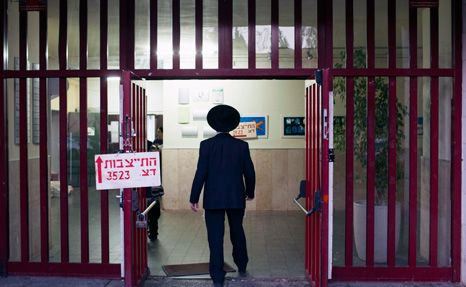The Haredi Draft: The Need for an Alliance of the Moderates
As coalition negotiations hinge on the issue of the Haredi draft, IDI Vice President of Research Prof. Yedidia Stern, who served on the Committee for Advancing Equality in Sharing the Burden, calls for a historic alliance between religious and secular moderates that will yield a solution that addresses the need for ultra-Orthodox army service while taking into the Haredi community’s most important values.

Although a great many issues are awaiting resolution on Israel's national table, the parties involved in the current coalition negotiations have been focusing on one topic: the ultra-Orthodox. The headlines have focused on the political aspect of this issue, and have concerned themselves with the question of whether or not the coalition will include the ultra-Orthodox parties. But regardless of the makeup of the next government, the essential question that demands an answer is: What is the most appropriate way to address the issue of the Haredi draft?
The challenge is enormous: Most ultra-Orthodox men in Israel postpone their army service, claiming that "Torah is their profession," and are therefore prevented by law from acquiring a profession and from entering the workforce until a relatively old age. This is a catastrophe on many levels. On the level of the Haredim themselves, most Haredim (56%) are trapped in humiliating poverty, and some succumb to the temptation to work illegally in the black economy. On the state level, some 14% of each potential annual intake of the Israeli army are young men who are part of the Haredi "society of learners," which dilutes the human resources necessary for national security. The current situation is destructive to the Israeli economy, costing an extraordinary amount of money in excess of eight billion shekel a year.
It is important to note that the Haredi community in Israel is made up of 750,000 men and women, half of whom are under the age of 14. The rate of population growth in this community is three times the growth rate of the rest of Israel's population. This is a catastrophic geometric progression that will erode Israel's security, economy, and solidarity if it persists over time.
Most Haredim are acutely aware of the difficulty. New trends are beginning to emerge that can be seen as indicators of profound change: Over 6,000 ultra-Orthodox students are currently enrolled in colleges and academic institutions where they are acquiring a profession. There is also rising demand for military or civilian service within the Haredi community, even if it is somewhat limited in scope. In addition, an ultra-Orthodox middle class is beginning to emerge, although it is still a thin segment of the community. These tentative, preliminary steps are general indicators of change, but their future is far from secure. The conservative forces within Haredi society are extremely powerful, and every window that is opened to the world is guarded by a zealous guard who seeks to close it. The bulk of the struggle is yet to come.
The essential challenge facing those who are involved in the negotiations on the arrangement that will ensure equal sharing of the burden of military service is to stand firm on two fundamental commitments. The first is to arrive at an arrangement that will bring about a historic change in the relationship between Israel's ultra-Orthodox community and Israeli society in general. The aim should be to arrive at a rate of Haredi military service—not civilian service—that is close to the rate of service of Israel's general population. This service must take place at an age that is young enough to enable ultra-Orthodox men to integrate naturally into the academic world and the workforce following their army service, in rates that are similar to those of the rest of the population. While this change must be implemented gradually, the process must be measurable and must start immediately. The second commitment is for the state to avoid the use of coercive force against those who see the study of Torah as their life's mission, and to take all necessary steps to protect the unique Haredi identity of those ultra-Orthodox Jews who choose to serve in the army.
It is possible to reach an arrangement that meets both of these goals. In order to do so, we must create a prudent framework that will allocate the financial resources that are currently transferred to the Haredim differently, such that institutions of Torah study only benefit from the state coffers if they allow and encourage students who are willing to integrate into general society to serve in the Israeli army once they have consolidated their identities—at an age not older than 22. This framework must provide a real and definitive response to the cries of discrimination that are rising from the majority of the Israeli public, which serves in the army today, while at the same time respecting the sensitivities of the ultra-Orthodox community.
The time has come for a historic alliance between the moderates in the two camps. It is imperative to ignore the discourse of hatred that defines the ultra-Orthodox as ignorant parasites, and it is equally imperative to ignore the discourse of hatred that defines the secular as religion haters and enemies of Judaism. Now is the time for responsible politics that sees drafting the Haredim while at the same time taking into account the values that they hold most dear as two vital sides of the same national coin.
Prof. Yedidia Z. Stern is Vice President of Research of the Israel Democracy Institute and a member of the Faculty of Law at Bar-Ilan University.
A Hebrew version of this op-ed was originally published in Yedioth Ahronoth on February 21, 2013.
